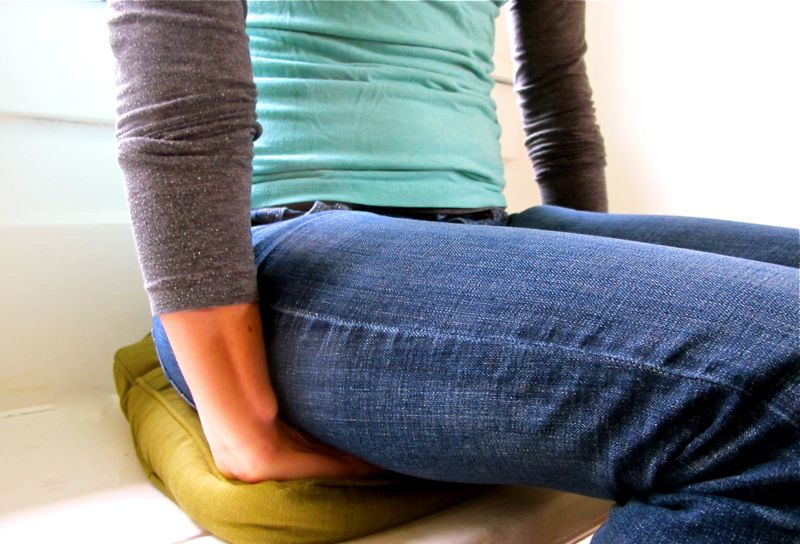Acupuncture Strategies for Disconnecting in Order to Reconnect With Yourself
1. Sit on your hands.
Psychological reasons may be the primary drivers behind compulsive phone checking, but after a while, we also start to develop a hand fixation. Too many minutes without swiping that screen and we actually get jittery, unsure of what to do with our hands.

Help yourself resist the temptation by sitting on your hands. Do it the way that probably feels counterintuitive, with the back of your hand touching your pants and the palm touching the seat (see picture).
Most compulsive phone checkers readily admit that stress and anxiety contribute to their bad habit. This technique is great because it prohibits you from reaching for the phone and also gives a nice stretch to the Pericardium meridian. Located along the inner wrist and arm, Pericardium is a go-to meridian for treating stress and anxiety with acupuncture.
2. Play with your ears.
Again, you want to keep those hands occupied. The most widely used acupuncture protocol for drug and alcohol addiction is called NADA, which consists of five acupuncture points in each ear. NADA is so effective at reducing drug and alcohol, as well as smoking and food, cravings because it reduces anxiety and can calm the nervous system.
While it may not be as serious as substance abuse, compulsive phone checking really can be an addiction.
You don't have to worry about hitting the exact NADA points for this to be effective. Just grab hold of your ears and massage them all over. AcuTake contributing writer Eric Kerr shows how to do this in this video.
3. Leave it at home.
Acupuncture, because it does not deal in absolutes, teaches us to acknowledge the impermanence of our conditions, the inevitability of change. In other words, whatever you think you're missing by not checking your phone is going to happen regardless of whether you know about it. So leave it at home.
I'm not talking about going the whole day without your phone. We live in a time when phones really have become borderline necessities -- in moderation. When I say leave it at home, I mean for an hour or two. The idea is to train yourself to realize that you don't need your phone every second of the day.
So maybe it's when you take your dog for a walk, or go to a movie, or take a trip to the grocery store. Try leaving your phone at home during these times.
If it feels too difficult to leave it at home, try leaving it in the car when you go into the store. Or if even that's too much, start by bringing it with you but trying to keep it in your bag during the time you're in the store. Ease into this at whatever pace feels manageable. As you get used to doing it in small chunks, it becomes easier to go for longer without checking.
4. Turn it off at 7 p.m.
In acupuncture, each system throughout the body has an associated two-hour time frame. The 7-9 p.m. block is associated with Pericardium, which is commonly used to address stress, anxiety, and insomnia.
This two-hour window also happens to be when we should start winding down in order to fall asleep at a reasonable hour. Yet many of us are glued to our phones right up until bedtime.
By committing to a 7 p.m. shut-off rule, you'll decrease not only your stress and anxiety levels but also the likelihood of suffering from insomnia.
After practicing these techniques, I'm far from cured. The "Put Me Down" image on my iPhone up there, originally intended as a temporary prop for this article, has remained as a necessary reminder. However, they really have helped me reduce the frequency and urgency with which I check my phone. Maybe they can help you too.
http://www.huffingtonpost.com/sara-calabro/acupuncture-tips_b_1485446.html?ref=healthy-living
No comments:
Post a Comment